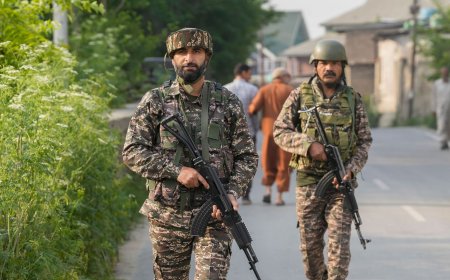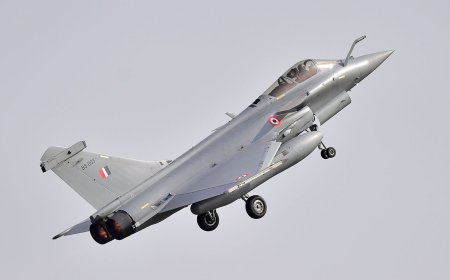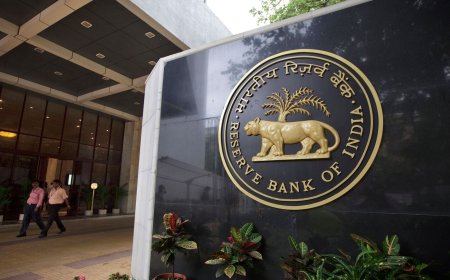Sensex Plunges 900 Points, Nifty Tests 24,000 as India-Pakistan Conflict Escalates; India VIX Spikes Over 10%
Indian stock markets witnessed a sharp decline amid escalating India-Pakistan tensions, with Sensex dropping 900 points and Nifty testing the 24,000 mark. The volatility index, India VIX, surged over 10%, reflecting heightened investor anxiety.

Sensex Plunges 900 Points, Nifty Tests 24,000 as India-Pakistan Conflict Escalates; India VIX Spikes Over 10%
Introduction
The Indian stock market faced significant turbulence on May 9, 2025, as escalating tensions between India and Pakistan led to a sharp sell-off across sectors. The BSE Sensex plummeted by over 900 points, while the NSE Nifty 50 tested the psychological 24,000 mark. Concurrently, the India VIX, a measure of market volatility, surged over 10%, indicating heightened investor anxiety.(Business Standard)
Market Overview
At 10:06 AM IST, the Sensex was down 971.42 points or 1.21% at 79,363.39, and the Nifty was down 319.05 points or 1.31% at 23,954.75. The market breadth was overwhelmingly negative, with 431 shares advancing, 2,626 shares declining, and 103 remaining unchanged. Investor wealth amounting to approximately ₹5 lakh crore was eroded as the India-Pakistan tensions rattled market sentiment. (Moneycontrol)
Key Factors Behind the Market Decline
1. Escalating India-Pakistan Tensions
Reports indicated that Pakistan launched missile attacks across multiple regions along the Indian border, including Jammu & Kashmir, Punjab, Rajasthan, and Gujarat. All missiles and drones were successfully intercepted or neutralized by the Indian Armed Forces. Amid the attacks, several cities, including Jammu, Jalandhar, Hoshiarpur, and Jaisalmer, observed complete blackouts. Delhi was also placed on high alert as a precautionary measure. (Moneycontrol)
2. Surge in India VIX
The India VIX, often referred to as the market's fear gauge, spiked over 10% on Thursday, marking the biggest single-day rise in a month. This surge was attributed to concerns over the escalating military conflict between India and Pakistan, which unnerved traders and led to a late sell-off in equities. (The Economic Times, The Economic Times)
3. Sectoral Impact
All 13 sectoral indices on the NSE were trading in the red. The BSE Realty index was the top loser among sectoral indices, down 2.7%. Hotel and real estate stocks slipped up to 7% on Friday, reflecting the broader market's negative sentiment. (India Today, Business Standard)
4. Broader Market Sentiment
The broader markets mirrored the benchmark indices' decline. The Nifty Midcap100 and Nifty Smallcap100 indices were in negative territory, declining 0.40% and 1.22% respectively. The market's volatility index, India VIX, also rose 3.51%, indicating increased volatility expectations. (Moneycontrol, India Today)
Defence Stocks Buck the Trend
Amid the market turmoil, defence and drone manufacturing stocks rallied on expectations of increased procurement amid rising military conflict. Stocks like IdeaForge and Zen Technologies saw significant gains, buoyed by investor bets on increased military procurement in the face of a widening conflict. (India Today)
Analyst Perspectives
Market experts suggest that while the immediate reaction to geopolitical tensions is negative, the underlying fundamentals of the Indian economy remain strong. VK Vijayakumar, Chief Investment Strategist at Geojit Investments, noted that the market's inherent resilience is supported by global and domestic macros, including high GDP growth expectations and a declining interest rate environment. (Business Today)
The Indian stock market's sharp decline on May 9, 2025, underscores the significant impact geopolitical tensions can have on investor sentiment. While defence stocks provided a silver lining, the broader market's performance reflected widespread concern over the escalating India-Pakistan conflict. Investors are advised to stay informed and exercise caution as the situation develops.
What's Your Reaction?
 Like
0
Like
0
 Dislike
0
Dislike
0
 Love
0
Love
0
 Funny
0
Funny
0
 Angry
0
Angry
0
 Sad
0
Sad
0
 Wow
0
Wow
0












































































